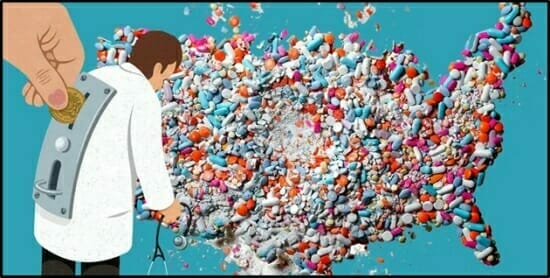“Americans spend more on prescription drugs than anyone else in the world,” states Bloomberg, “It’s true that they take a lot of pills. But what really sets the U.S. apart from most other countries is high prices.”
Cancer drugs in the U.S. routinely cost $10,000 a month. The cost for old drugs has spiked, as companies purchased patents with no competition and jacked the prices.
Last week Democrat-controlled congress passed a drug price bill (230 to 192), backed by Speaker Nancy Pelosi, aimed at lowering drug prices.
The “Lower Drug Costs Now Act” would empower the U.S. government to negotiate for the best prices on 50 expensive brand-name drugs and up to 250 medications, including insulin.
Prices would be synchronized with other countries where it is illegal to bribe politicians. This act would dictate that the price of medicine can not be more than 20% higher than other countries like Canada.

The historic Lower Drug Costs Now Act will empower Medicare to negotiate drug prices for the first time in the history of the program and makes those prices available to all Americans with insurance,” bragged Energy and Commerce Chairman Frank Pallone, Jr (D).
The legislation is projected to save American prescription drug users about half a trillion dollars over ten years.
Big Pharma is not amused.
“This would lead to the loss of anywhere from 30 to 100 or more new medicines over the next 10 years, leaving patients with some of the serious diseases, like Alzheimer’s, ALS and cancer, without hope for the treatments and cures they need,” stated Stephen Ubl, CEO of PhRMA, a lobbying group.
“We are not gouging you!” claims Big Pharma, “We are just trying to make a few shekels doing God’s work. If you take away our shekels we might get discouraged and stop doing the work” (even though God is still watching).
According to data from Axios Research, while drug companies bring in 23% of health care’s U.S. revenue, they make 63% of the total profits.
“In 2018, the CEOs of major pharmaceutical companies Allergan, Johnson & Johnson, and Pfizer made a total of $90 million,” states Biz Insider, “Americans—whose tax dollars play a critical role in funding R&D, are not receiving anything close to a fair return on their investment”.

Big Pharma isn’t the only entity objecting to the Lower Drug Costs Now Act.
A consortium of 135 “Emerging Biotech Leaders” penned an open letter to congress claiming that, the “Lower Drug Cost Now Act, will shatter the dreams of patients and families who stand to benefit from the extraordinary science happening in labs across America.”
Paul Hastings, the CEO of NKarta Therapeutics, a private company developing cell therapies to fight cancer, is another detractor of the Lower Drug Costs Now Act.
Saying, “I’m against Lower Drug Costs Now” sounds grinchy, so – in an open letter – Hastings refers to the act by its formal name, H.R.3.
“H.R. 3 authorizes the federal government to impose a staggering 95% excise tax on drug makers who don’t play ball,” complains Hastings, “Small and emerging biotech companies like mine have warned of a “nuclear winter” if this disastrous legislation is codified.”
Hastings’ 5 “Lower Drug Costs” take-aways:
- It will Spook Biotech Investors: “House Democrats either did not read or were unmoved by multiple studies suggesting tremendous peril for small and emerging biotechs if the legislation becomes law and our investors run for the hills.
- People in the future might die: “Shockingly, some Democrats went on the record saying a trade-off — lower prices now for fewer cures in the future — is acceptable. Rep. Darren Soto (D-Fla.) said, ‘I frankly think it’s worth it.’ “
- It reminds U.S. citizens they hate us: “A Gallup poll released this fall found that drug manufacturers had become our nation’s lowest-rated industry.” We have “slipped below industries like Big Oil, Big Tobacco, and gun makers, whose products shorten and end lives.”
- Insurance companies are the real bad guys: “H.R. 3 seeks to lower a drug’s wholesale costs and asks us to hope and pray that insurers will lower deductibles in response. They won’t.”
“I am no apologist for drug companies behaving badly and have consistently spoken out against egregious price increases and frivolous patent extensions,” added Hastings, “No senior should have to choose between medicine and groceries.”
Giving a nod to the greedy health insurers, Hastings suggests that “Patients stuck in high-deductible plans should be allowed to pay their deductibles in installments over 12 months — not all of it at the beginning of the year.”

Pharmaceutical companies in the U.S. paid about $118 million in bribes last year to politicians, lobbying for policies that will maximize their profits.
In America, a vial of Humalog – a Type 1 diabetes medication – costs $300.
Pharmaceutical companies in Canada are not allowed to bribe politicians, but they spent $80 million bribing doctors.
In Canada, the same vial of Humalog cost $35.
The lesson?
It’s more effective to bribe politicians than doctors.
Health Industry observers unanimously predict that the, “Lower Drug Costs Now Act” will die a quick death in the U.S. Senate.
– Lukas Kane


Leave a Reply